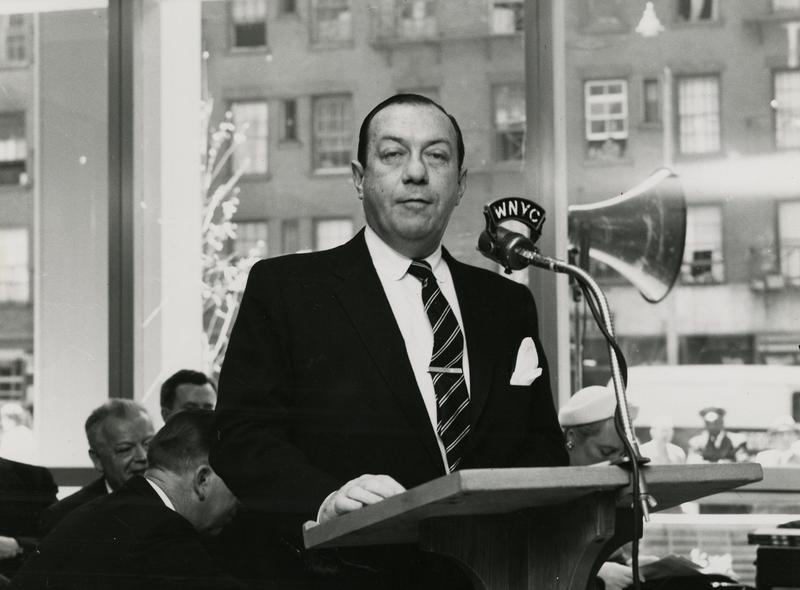 The NYPR Archive Collections
The NYPR Archive Collections
Nightsticks, Curfews, and Juvenile Delinquency

Mayor Wagner, Police Commissioner Kennedy and Director of Youth Activities, Commissioner Ralph Whelan. Gabe Pressman reads questions sent in by the public regarding curfews, the use of nightsticks and police force in curbing juvenile delinquency.
Wagner: "We want to see these hoodlums off the streets of New York...but we also have to be sure that we do not be accused of police brutality." Kennedy: "There is a lot of confusion in the public mind about the use of force. The police department is not a punitive agency, but it's also not a social service agency. It is a law enforcement agency." (Someone lights a cigarette.) The force or violence is not more than sufficient to prevent such an offense. When any police officer performing his sworn duty applies reasonable and necessary force, I back him a thousand percent.
Whelan talks about the role of the Youth Board. Youth Board contacts fighting gangs. He does not condone antisocial, delinquency or crimes by children, youth or adults. If we know of any delinquency, rumble, pushing of dope, carrying of knives or guns, we immediately contact the police department. "Gangs in NYC exist and someone has to reach them. Somebody has got to work with them and convert their activities into socially acceptable activities and make them law-abiding citizens."
The enforcement of curfew in New York City would be difficult. 97% of youngsters are fine, the rest come from very unhappy homes and will do anything to stay away from these homes. Not self-executing. Discriminatory practices in enforcing. Best possible curfew would be parental authority and discipline. This is not a job just for law enforcement agency; this is a job for the total citizenry of New York City.
Are coddlers responsible for recent gang outrages? Or perhaps, lenient judges and over sympathetic youth board consultants? Wagner: Some of these youngsters need help. Some are only first offenders, not hardened criminals but need some guidance and some help. Hardened, tough youngsters have to be sent to institutions where they receive a good, full training. Shortage of these facilities and therefore is a backlog of youngsters staying in youth houses waiting to be transferred. I am opposed to coddling of these hoodlums. We want to save them so they can become decent citizens.
Herbert Hoover, former President of the United States, Chairman of the Board of the Boys' Club of America sent in a question. He suggests the support of organized character-building agencies. Wagner: Brought in all of these voluntary groups and religious groups to help. Juvenile delinquents are not attracted to the settlement houses or other programs. Whelan agrees.
Wagner and Kennedy on gun control. Kennedy - "The Police Department has the duty to strictly enforce the law. And where there is any resistance to a lawful arrest, force must be met by force. And it must be reasonable in degree. But the police department, I must emphasize, is not a punitive agency. It must not take the law into its own hands. Due process has not passed out of vogue in this country or this city."
Audio courtesy of the NYC Municipal Archives WNYC Collection
WNYC archives id: 5713
Municipal archives id: LT8817